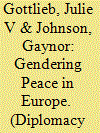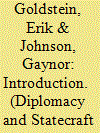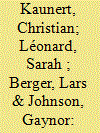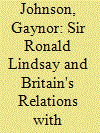|
|
|
Sort Order |
|
|
|
Items / Page
|
|
|
|
|
|
|
| Srl | Item |
| 1 |
ID:
176161


|
|
|
|
|
| Summary/Abstract |
This introduction tracks how international and diplomatic history have, gradually, been gendered, as well as tracing the evolving interest in the role of women in peace movements. Most articles in this special issues developed from contributions to the ‘Gendering Peace in Europe’ conference held at the University of Sheffield in January, 2017, and here we consider the ways in which the category of gender can be more firmly embedded into research in the field of diplomacy and statecraft.
|
|
|
|
|
|
|
|
|
|
|
|
|
|
|
|
| 2 |
ID:
129674


|
|
|
|
|
| Publication |
2014.
|
| Summary/Abstract |
This special issue of Diplomacy & Statecraft is in recognition of the contribution of Richard Langhorne to the fields of international history, diplomacy, and statecraft. He was a member of the founding Editorial Advisory Board of Diplomacy & Statecraft in 1988 and has served on that board for a quarter of a century, providing important guidance and notable contributions over many years. In his service to the scholarly world, beside his involvement with Diplomacy & Statecraft, Richard was one of the initial committee members of the British International History Group, of which he was the founding chairman and whose successful launch and in its early years he did much to ensure.
|
|
|
|
|
|
|
|
|
|
|
|
|
|
|
|
| 3 |
ID:
134273


|
|
|
|
|
| Summary/Abstract |
Does the Arab Spring provide a new opening for Western cooperation with the Middle East? The Arab Spring involved a revolutionary wave of demonstrations and protests in the Arab world, starting on 18 December 2010, which forced rulers, at least partially, from power in Tunisia, Egypt, Libya and Yemen. Egypt, however, has since seen a reactionary movement re-establishing military power to the pre-revolutionary state. Additional uprisings occurred also in Bahrain and Syria, the latter escalating into full-scale civil war. A number of other countries have also seen serious protests, ranging from Algeria, Iraq, Jordan and Kuwait to Morocco. It is particularly noteworthy that the fallout from the war in Libya has had side effects for a simmering rebellion in Mali, where it appears that al-Qaeda is establishing itself in the north of the country. The European Union (EU) has been concerned about such an eventuality in the Sahel for some time. While some observers have drawn comparisons between the Arab Spring and the revolutions of 1989 in Eastern Europe, the precise endpoint and the direction of the Arab Spring revolutions remain to be identified. In short, the Arab world currently faces a period of social protest and change, which challenges our understanding of politics in the region and established assumptions about Western foreign policy towards this region.
|
|
|
|
|
|
|
|
|
|
|
|
|
|
|
|
| 4 |
ID:
178365


|
|
|
|
|
| Summary/Abstract |
This article explores the preparation made by the British government, primarily the Foreign Office, for the state visit of King George VI and Queen Elizabeth to the United States three months before the outbreak of the Second World War. It considers the dynamics of the relationship between the officials in Whitehall, the British ambassador in Washington, Sir Ronald Lindsay, the agenda of the Roosevelt administration and the role of the British royal family as ambassadors in their own right. Lindsay’s role was also pivotal because he was a personal friend of the King and was also on much respected and influential figure in Washington. The article does not discuss the course of the state visit, although there is discussion of the literature that relates to it. However, it does reveal that securing a concrete alliance with the United States was not the priority of the British government in the summer of 1939; that the focus of the Foreign Office, in particular, was on the growing diplomatic crisis in Europe. Lastly, the article argues that in the months leading up to the outbreak of the Second World War, the Foreign Office was confident in its own ability to lead the formulation of British foreign policy; that it was not eclipsed by Neville Chamberlain’s very personal involvement in appeasing the fascist dictators.
|
|
|
|
|
|
|
|
|
|
|
|
|
|
|
|
| 5 |
ID:
129679


|
|
|
|
|
| Publication |
2014.
|
| Summary/Abstract |
Of the five diplomats who held the post of British ambassador to Berlin during the interwar period, the two-year embassy of Sir Ronald Lindsay, 1926-1928, has received least attention by historians. This article charts three main aspects of Lindsay's career in Berlin. The first of these is his relationship with the Foreign Office, which is consistently good although Treasury comments on his reports about Germany's continuing financial problems expose some of the friction within the British government about how best to deal with the German reparation problem. The second area explored by the article examines Lindsay's views on the "German question," and suggests that the post-Locarno period did not witness a significant growth of trust between Britain, France and Germany on questions concerning international security. Finally, the article examines how Lindsay's thinking about German affairs compares to his predecessor and his successors and explores Lindsay's views about the likely trajectories of German foreign policy.
|
|
|
|
|
|
|
|
|
|
|
|
|
|
|
|
| 6 |
ID:
176169


|
|
|
|
|
| Summary/Abstract |
The history of modern British foreign policy largely devolves from an exclusively male perspective. In many respects, this was natural and appropriate because, until the 1940s, only men held senior positions in the Diplomatic Service. During the early twentieth century, attempts to change the “Foreign Office mind” to promote a greater acceptance of the role of women in the conduct and formulation of British diplomacy remained largely resisted. However, when examining the careers of the other group of women who worked at the Foreign Office, the clerical staff, the vast ranks of filing clerks, and shorthand typists, a very different view of this bastion of male conservatism emerges. With prosopography and on-line genealogy resources, this analysis traces a large cross-section of these women and analyses their life patterns and working experiences. It reveals that many of these women enjoyed quite a flexible working experience, with plenty of opportunities for career advancement, with some even transferring from the clerical classes to the Consular Service. This exegesis represents the first attempt to use prosoprographic techniques in the study of British foreign policy and suggests other ways to expand the present study and other similar projects undertaken to examine other government departments concerned with foreign affairs.
|
|
|
|
|
|
|
|
|
|
|
|
|
|
|
|
|
|
|
|
|